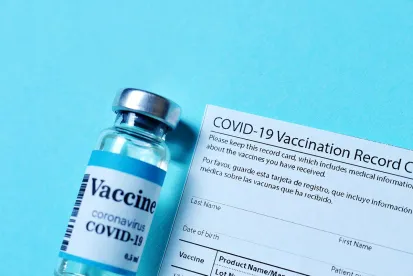On May 7, 2021, Montana governor Greg Gianforte signed into law Montana House Bill 702, under which Montana became the first jurisdiction to recognize an individual’s vaccination status as a protected category. The law also prohibits employers from requiring employees to disclose their immunization status and bars employers from requiring employees to receive certain types of vaccines or to possess an immunity passport. The law is effective immediately.
Definitions and Coverage
The law defines “vaccination status” as “an indication of whether a person has received one or more doses of a vaccine.” An “immunity passport” is “a document, digital record, or software application indicating that a person is immune to a disease, either through vaccination or infection and recovery.”
Under the law, businesses, governmental entities, and places of public accommodation may not refuse to serve or withhold goods from any person “based on the person’s vaccination status or whether the person has an immunity passport.” Likewise, employers may not discriminate against or refuse to employ an individual based on whether the person has been vaccinated or possesses an immunity passport. The law bars employers from requiring employees to receive vaccines, such as the current COVID-19 vaccine, “whose use is allowed under emergency use authorization or any vaccine undergoing safety trials.”
Exceptions and Exemptions
The law contains a few defined exceptions and exemptions. Licensed nursing homes, long-term care facilities, or assisted living facilities are exempt from the law if complying with it would result in the facility violating regulations or guidance promulgated by the Centers for Medicare and Medicaid Services or the Centers for Disease Control and Prevention. The law permits healthcare facilities, as defined under Mont. Code Ann. Sec. 50-5-101, to ask their employees to volunteer their immunization status solely to design and enforce “reasonable accommodation measures to protect the safety and health of employees, patients, visitors, and other persons from communicable diseases.” The law requires healthcare facilities to follow through with implementing such measures. If an employee of a healthcare facility declines to provide his or her vaccination status, the law permits the healthcare employer to assume the employee is not vaccinated. The law also permits business and governmental entities to recommend that their employees be vaccinated.
Enforcement
The new law is codified as an “integral part” of Montana’s existing laws prohibiting various forms of unlawful discrimination, and it draws upon procedural and enforcement mechanisms broadly applicable to other claims of discrimination. As a result, an individual alleging discrimination on the basis of vaccination status can file a complaint with the Montana Human Rights Bureau (MHRB) within 180 days after the alleged unlawful discriminatory practice occurred or was discovered.
Once an individual files a complaint with the MHRB, the agency has a statutory duty to investigate and, as in other instances of alleged employment discrimination, “determine whether there is reasonable cause to believe that the allegations are supported by a preponderance of evidence.” Upon a reasonable cause finding, if conciliation efforts are not successful, the matter proceeds to a hearing.
Hearings proceed under applicable portions of the Montana Rules of Civil Procedure, including its allowance for written and other discovery. A successful claimant may be awarded economic and compensatory damages, but not punitive damages, to rectify any alleged harm. In addition, a prevailing party may bring a separate action in state court for attorneys’ fees and costs.
Accordingly, an adverse finding against an employer under Montana House Bill 702 may expose employers to damages similar to other types of claims alleging unlawful discrimination.
Ogletree Deakins will continue to monitor and report on developments with respect to the COVID-19 pandemic and will post updates in the firm’s Coronavirus (COVID-19) Resource Center as additional information becomes available.





 />i
/>i

